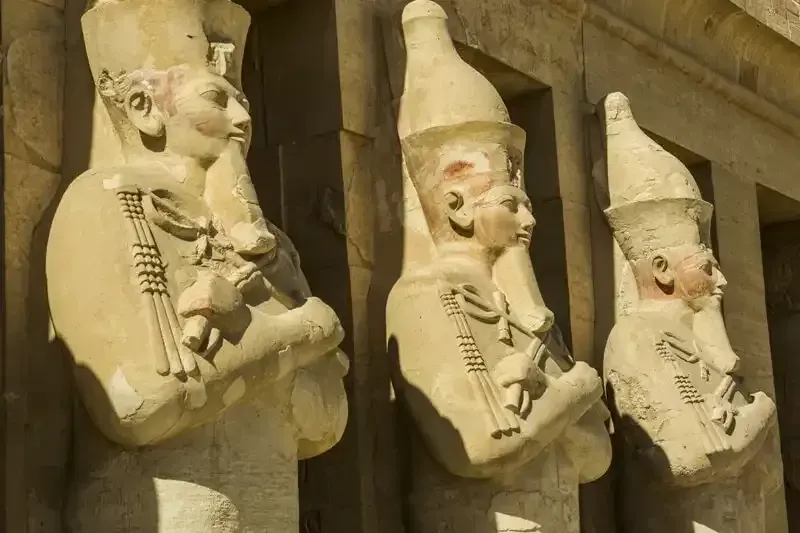The Pharaohs of Egypt: Divine Rulers of an Age-Old Civilization
Between golden sands and granite slabs, a powerful aura permeates the air of the pharaohs. These iconic rulers had been far more than kings-they were considered living gods; their duty was to lead the people and keep the balance of the universe. With all power and divine status, the pharaohs, therefore, determined the culture, the religion, and the history of one of the most extraordinary civilizations of the world.
Every granite block from monumental temples to soaring pyramids speaks of the ambition of the kings, worship, and their search for immortality. The lives of these ancient kings continue to mesmerize the world, offering a glimpse into a world of majestic mystery and extraordinary acuities that even today combine to captivate the imagination.

The Divine Right of Kings
The Egyptian pharaohs were seen not only as rulers but as living gods on Earth. Entrusted with the responsibility of maintaining balance, justice, and harmony (ma’at), they stood at the heart of religion, politics, and daily life. Their presence shaped the culture and identity of ancient Egypt for thousands of years.
Walking in their footsteps remains a key part of any Egypt travel itinerary, where travelers discover ancient tombs, towering statues, and spiritual symbols carved into stone—lasting testaments to pharaonic power.
Monumental Achievements of Egyptian Civilization
The legacy of the pharaohs is not just written in texts but carved into massive monuments that still stand today. One of the most iconic is the Great Pyramid of Giza, built by Pharaoh Khufu around 2580–2560 BCE. Using over two million stone blocks, it remains a true marvel of ancient engineering and one of the Seven Wonders of the Ancient World.
Temples like Karnak and Luxor, dedicated to deities such as Amun, Mut, and Khonsu, showcase the pharaohs’ devotion to religion and their quest for immortality. Their colossal columns, intricate hieroglyphs, and towering obelisks offer a direct link to a world of divine rule and sacred power.
The First Pharaohs: King Narmer
The dawn of pharaonic rule began with Narmer, the legendary unifier of Upper and Lower Egypt around 3100 BCE. His reign marked the beginning of dynastic Egypt, a pivotal moment in world history. His name and legacy remain preserved on the Narmer Palette—a powerful symbol of unity and divine kingship.
For travelers designing an Egypt travel itinerary, learning about Narmer and his era helps frame the beginnings of this ancient empire, often highlighted on Cairo day tours and excursions into early dynastic sites.
Glorious Builders of the Old Kingdom: Djoser and Khufu
During the Old Kingdom (2686–2181 BCE), the pharaohs became legendary builders. Djoser, ruler of the Third Dynasty, commissioned the Step Pyramid at Saqqara, designed by his chief architect, Imhotep. It was the first large-scale stone monument ever built.
Later, Pharaoh Khufu of the Fourth Dynasty would create the awe-inspiring Great Pyramid. These feats remain unmatched in scale and mystery, forming essential highlights for anyone exploring Egypt’s royal legacy.
A Powerful Woman Pharaoh: Hatshepsut
One of Egypt’s most remarkable rulers was Hatshepsut, a female pharaoh of the 18th Dynasty. She ruled during a time of peace and prosperity, commissioning trade expeditions and grand architectural projects.
Her mortuary temple at Deir el-Bahari, with its unique terraces and colonnades, is a key feature in many visitors’ journeys and reflects her strength, vision, and divine status.
The Religious Revolutionary: Akhenaten and Queen Nefertiti
Pharaoh Akhenaten transformed Egyptian religion by promoting the worship of a single deity—Aten, the sun disk. He built a new capital, Akhetaten (modern-day Amarna), and ruled alongside Queen Nefertiti, whose beauty and power remain legendary.
Their era is remembered as one of radical change and artistic revolution, often explored in cultural trips and historical exhibitions.
Tutankhamun: The Boy King
Although his reign was short, Tutankhamun left a legacy that captivated the world. His nearly intact tomb, discovered in 1922, revealed a golden treasure trove, including his iconic funerary mask.
His story continues to fascinate visitors and remains one of the most iconic chapters in the story of the Egyptian pharaohs.
The Great Ramses II
Ramses II, known as Ramses the Great, ruled for over 60 years during the 19th Dynasty and left an indelible mark on Egypt. He built monumental temples including Abu Simbel and the Ramesseum, showcasing his power, military victories, and religious devotion.
These temples, particularly accessible through Aswan day tours, represent the peak of ancient Egypt’s architectural and political power.
The Last Pharaoh: Cleopatra VII
The final ruler of ancient Egypt, Cleopatra VII, was known for her intelligence, political skill, and dramatic life. Her alliances with Julius Caesar and Mark Antony were central to Egypt’s final attempts to remain independent from Roman rule.
Her story adds a captivating end to the pharaonic era and remains a timeless symbol of leadership, charm, and strategic brilliance.
The Fall of Ancient Egypt
With Cleopatra’s death in 30 BCE, Egypt fell under Roman control, marking the end of thousands of years of pharaonic rule. This transition changed Egypt forever but couldn’t erase the legacy of its rulers, which continues to shape how the world views ancient civilization.
Belief in the Afterlife
Pharaohs believed in an eternal life after death, leading to complex burial rituals and grand tombs filled with treasures and religious texts. The Book of the Dead, elaborate mummification practices, and offerings were all part of preparing for the journey to the afterlife.
This deep spiritual belief system reveals the pharaohs’ desire to achieve immortality and maintain their divine status for eternity.
Legacy and Modern Fascination
From tomb discoveries to modern exhibitions, the fascination with Egyptian pharaohs continues to grow. Their influence can be seen in art, architecture, film, and literature around the world. Each pharaoh’s legacy contributes to Egypt’s timeless appeal as a land of mystery, power, and wonder.
Whether you're planning an Egypt travel itinerary or exploring new destinations like Aswan day tours, the legacy of the pharaohs ensures every journey into Egypt’s past is unforgettable.

.jpg)

.jpg)
.jpg)






